

Program in Ecology and Evolution
Interdisciplinary Program
Debbie Swierczek, Program Coordinator
School of Graduate Education
Knight Hall 247
Phone: 307-766-4128
Email: ecology@uwyo.edu
Students in Program in Ecology and Evolution study a diverse set of ecological questions, ranging in scale from DNA and microbes to plant and vertebrate systematics, to landscape ecology and everything in between. All PhD students in Program in Ecology and Evolution also belong to a home department.
>>Apply to the Program in Ecology
Advisor: Melanie Murphy 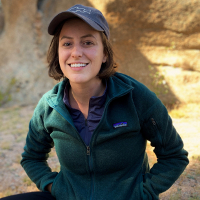
Home Department: Ecosystem Science and Management
Broadly, I’m interested in conducting research to better inform current conservation and management practices for sensitive taxa, particularly amphibians. My PhD research is focused on learning more about habitat use, survival, disease ecology, and the community changes in the microbiome of the endangered Wyoming toad after release from captivity.

Advisor: Daniel Laughlin
Home Department: Botany
My research is focused on the effects that functional traits have on demographic fitness in perennial graminoid species. I investigate how inter- and intra-specific variations in key function traits related to drought tolerance and plant energy economics affect vital rates in plant populations. These variations reflect different life history strategies and ultimately differences in demographic fitness observed along environmental gradients.
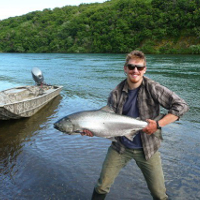 Advisor: Annika Walters
Advisor: Annika Walters
Home Department: Zoology & Physiology
I am interested in the linkages between habitat heterogeneity, life history, and metapopulation stability. My dissertation is focused on understanding the role of spring-fed streams to Yellowstone cutthroat trout. I use observational field studies, genomic techniques, and statistical models to understand individual behavior and population dynamics and demographics across riverscapes. Through my research I aim to provide resources managers with a mechanistic understanding of the benefits of alternative conservation strategies.
Visit Jeff's website for more about his research.
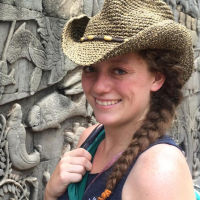
Advisor: Dave Tank
Home Department: Botany
I study population genetics, specifically the consequences of rarity for plant genetic diversity and plant microbiomes. I am also interested in advancing the field of informal science education through outreach and research with the Microbestiary.
Visit Erin's website for more about the Microbestiary.
Advisor: Brent Ewers
Home Department: Botany
I am a scientist, guide, and film-maker based in Jackson Wyoming pursuing a PhD with Dr. Brent Ewers in the Program in Ecology and Evolution. I serve as the Forest Botanist for the Bridger-Teton National Forest. In my "spare time" I enjoy exploring the mountain with my wife, Julia, and dog Chiquita.
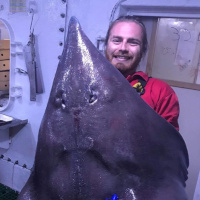
Advisor: William Fetzer
Home Department: Zoology & Physiology
Research is focused on using diets and stable isotopes to study and quantify the energy flow pathways to prey fish within the Great Lakes. Funded by the Great Lakes Fisheries Trust, the project aims to gain a clearer understanding for fisheries managers in the Great Lakes region.
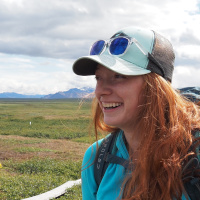
Advisor: Dave Tank
Home Department: Botany
My research focuses on systematics of North American willows (genus Salix). I’m especially interested in polyploid evolution species delimitation among Arctic species.
Advisor: Di Yang
Home Department:
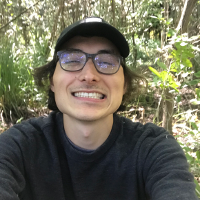
Advisor: Ellen Currano
Home Department: Geology
I am interested in learning how we can extrapolate from fossilized leaves to a broader understanding of an ecosystem at large. Leaves are just one part of a plant, but they can carry a lot of information about how that plant interacts with its environment. To that end, I’m interested in researching the relationships between fossil leaf functional traits, climate, and leaf architecture.
Visit Matt's website to learn more about his research.
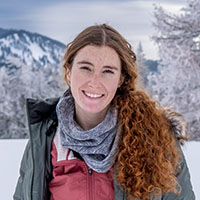
Advisor: Jerod Merkle
Home Department: Zoology & Physiology
My research focuses on ungulate (bison, elk, mule deer, pronghorn, and bighorn sheep) migrations in the Greater Yellowstone Ecosystem. I am investigating the community and movement ecology of these species to help understand why a large diversity of movement strategies exist among sympatric ungulates.
Visit Molly's website to learn more about her research.
Advisor: Cynthia Weinig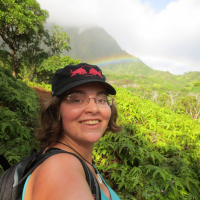
Home Department: Botany
My research investigates whether microbial communities associated with the rhizosphere and phyllosphere of plants exhibit diel cycling, related to the circadian period of the associated plant. Wyoming native plant species Boechera stricta is under investigation. Current projects investigate reproducibility in the field, the magnitude of microbial changes across different latitudes, and the role plant exudates play in rhizosphere diel cycling.
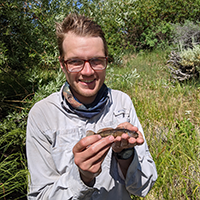
Advisor: Annika Walters
Home Department: Zoology & Physiology
Niall's current research is determining which fish species in Wyoming and Montana are most sensitive to climate change, where refuge habitats are likely to be located, and how stream restoration can help mitigate losses.
Visit Niall's website to learn more about his research.
Advisor: Jerod Merkle
Home Department: Zoology & Physiology
I am broadly interested in animal behavior and decision-making, with a specific interest in movement ecology. My research aims to understand how and why mule deer explore novel habitats. I hope a clearer understanding of exploration will strengthen management efforts for declining mule deer populations.
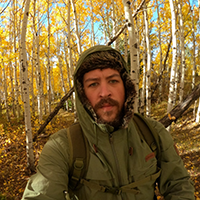
Advisor: Amy Krist
Home Department: Zoology & Physiology
My main interests are focused on aquatic ecology and understanding the processes that control nutrient cycling and ultimately the effect of those processes on producers and consumers. I am part of the NSF EPSCoR Track II project to help create a database of stoichiometric traits of organisms in their chemical habitats (STOICH). As a part of the STOICH project team, I’m working with Amy Krist to build a database on ecological stoichiometry and functional traits of zooplankton from alpine lakes in the Wind River Range.

Advisor: Lauren Shoemaker
Home Department: Botany
I am most interested in exploring the theoretical sides of community ecology, namely in relation to better understanding how synchrony operates in communities. I am also exploring how invasive species can change these synchrony dynamics after introduction. In addition to modeling, I am also using protist microcosms to predict how certain communities may respond to invasive species based on their demographic traits and environmental conditions.
Advisor: Joseph Holbrook
Home Department: Zoology & Physiology
My research focuses on the ecology of canid species—wolves, coyotes, and red foxes—within the Greater Yellowstone Ecosystem. I am exploring spatial overlap, dietary niche partitioning, and interspecies interactions among these three sympatric carnivores to develop key metrics for understanding species coexistence and trophic dynamics in a complex ecosystem.
Advisor: Melanie Murphy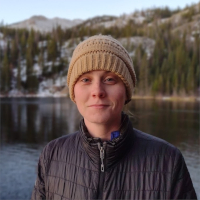
Home Department: Ecosystem Science & Management
I am primarily interested in how genes move across changing landscapes and using genetic tools to inform conservation and management. My PhD research is focused on understanding how a non-human ecosystem engineer, the beaver, drives biodiversity at different levels of the biological hierarchy. I will use eDNA to describe aquatic biological communities in beaver and non-beaver wetlands and landscape genetics to understand population genetic structure and connectivity in wetland-dependent amphibians.
Visit Katie's website for more about her research.
Advisor: Corey Tarwater
Home Department: Zoology and Physiology
Mary De Aquino is interested in the mechanisms that drive and maintain biodiversity. She received her B.S. from the University of California, Santa Cruz. Since then, she's been fortunate to work in diverse and beautiful landscapes from the plains of Montana to the cloud forests of Ecuador. For her dissertation, she is studying niche partitioning, species' roles, and the impacts of species loss in the mixed-species groups of birds that follow army ant swarms. Mary is also interested in science communication and enjoys sharing her love of science and the natural world with others. When not spending time outdoors, Mary enjoys sports, art, and hanging out with dogs.
Advisor: David Christianson
Home Department: Ecosystem Science and Management
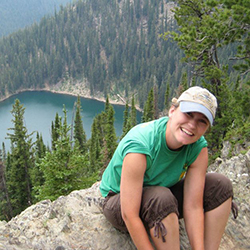
Advisor: Melanie Murphy
Home Department: Ecosystem Science and Management
I am interested in many aspects of ecological research with a focus on population and community ecology. More specifically, my research addresses species-habitat/landscape relationships in areas of development. For my dissertation research I am investigating the influence of energy development on landscape connectivity and distribution of Greater Sage-grouse for prioritizing reclamation efforts in Wyoming.
Advisor: Sara Germain
Home Department: Botany
I'm interested in determining how a changing climate has altered tree mortality across the western United States. My research aims to quantify the direct and indirect drivers of changing high-elevation forest composition using traditional and novel tree-ring analytical methods. I study these changes in mortality across varying spatial and temporal gradients, focusing on drought, temperature, pathogenic fungi, and insect-derived forest transformation.
Advisor: Anna Chalfoun
Home Department: Zoology and Physiology
Advisor: Topher Weiss-Lehman
Home Department: Botany
I have a broad interest in conservation biology, with a particular focus on how biotic and abiotic factors affect the species' spatial population dynamics. I am excited to use modeling approach to understand the underlying mechanisms of species' eco-evolutionary dynamics.
Advisor: Merav Ben-David
Home Department: Zoology and Physiology
My interests are population ecology, conservation, and education. At the University of Wyoming, I've completed projects on population genetics and genomics of river otters and hummingbirds. My doctoral work focuses on the phylogenomics of spotted skunk species.
Advisor: Tucker Furniss
Home Department: Ecosystem Science and Management
My research evaluates delayed post-fire tree mortality models in individual tree and stand-level mixed forests. Specifically, I am assessing second-order fire effect models and looking at how water stress, competition, and mountain pine beetles impact stand-level mortality in a warming climate. My work impacts land manager decisions to mitigate mortality and manage healthy forests.
Advisor: Jacob Goheen
Home Department: Zoology and Physiology
Advisor: Lusha Tronstad & Tim Collier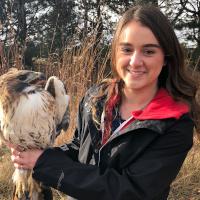
Home Department: Zoology & Physiology
I am broadly interested in the effects of climate, human activities, and species interactions on organismal survival and reproduction and species distributions. I have done previous work in the Atlantic Ocean focused on clams. My current work is investigating the historic and modern species distributions and conservation status of native mussels in Wyoming.
Visit Alexis' website for more about her research.

Advisor: Chistopher Weiss-Lehman
Home Department: Botany
My research is centered around evolutionary spatial dynamics. Specifically I am interested in how the process of species shifting their ranges may result in decreased genetic diversity and an increase in genetic load which may affect the persistence of species even after a successful range shift.
To study this I am using experimental microcosms of red flour beetles (tribolium castaneum) to examine the genomic consequences of range shifts with the goal of linking these genomics changes to ecologically important population metrics including fitness and adaptive potential.
Advisor: Brent Ewers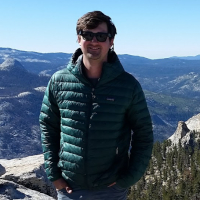
Home Department: Botany
I am broadly focused on plant physiology and how to gain insight into the mechanisms of plants' responses. My current research involves modeling sugarbeet growth and determining what measurable physiological processes are linked to the growth rate. I am hoping to further our understanding of mechanisms underlying vegetation responses to a changing environment brought on by climate change. There is a multitude of excellent plant physiological models and I am attempting to reparameterize them to work on many taxa for the benefit of agricultural and ecosystem sciences.
Advisor: Annika Walters
Home Department: Zoology & Physiology
Meredith is interested in understanding the influence of climate change and environmental
factors on aquatic communities that occupy high alpine lakes. Meredith aims to describe
the relationships between snowpack and ice phenology as they relate to biological
limnology, zooplankton community structure, and trout growth and reproduction under
the lens of climate change. Meredith utilizes a combination of field collection, laboratory
techniques, and remote sensing methods to better understand the seasonal dynamics
of this often-understudied ecosystem.
Meredith received her M.S. degree from the School of Aquatic and Fishery Sciences
at the University of Washington in Seattle, WA (2015). Her research focused on the
early marine growth and physiology of out-migrating juvenile salmon in the Salish
Sea and beyond. After completing her M.S. degree, Meredith accepted a professional
appointment as a Research Biologist at the Northwest Fisheries Science Center in Seattle
WA (2016-2022). During this time, she worked to understand and model the biological
and oceanographic factors influencing salmon growth in the Salish Sea, Columbia River
Estuary, and Northern California Current.
Beyond research, Meredith enjoys spending her free time in the mountains rock climbing
and backcountry skiing. Rest days include crossword puzzles and cuddling with her
cat Jasper.
Advisor: John Koprowski
Home Department: Zoology & Physiology
Ajay's research focuses on the impact of major conservation challenges, such as climate change and infrastructure development, on the habits and habitats of tigers in Nepal. He also investigates whether these challenges have led to an increase in human-tiger conflict. Furthermore, his study will explore the interactions between tigers and leopards, as well as how this interaction is contributing to the rising human-carnivore conflict in Nepal.
Advisor: Michael Dillon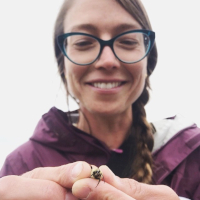
Home Department: Zoology & Physiology
Broadly, I am interested in how organisms cope with environmental variation from changes in their cellular composition to responses at the population level. Currently, we are identifying how bumble bees respond to temperature variation over short and long-term timescales. Upcoming work will focus on the effects of temperature on floral resources (pollen), and to what extent diet influences physiology. We hope to better understand how bumble bees alter their cellular composition across variable conditions as we identify the cascading effects of climate on these crucial pollinators.

Advisor: Jacob Goheen
Home Department: Zoology & Physiology
I study abundance-occupancy relationships in a small mammal community of central Kenya savanna. I test the predictions of two influential ecological hypotheses; 1) colonization-extinction rates hypothesis, which predicts restricted, rare species require dispersal from the surrounding region to maintain occupancy, whereas widespread, abundant species do not require such dispersal even though such dispersal will bolster their abundance, 2) resource-use hypothesis, that predicts resource generalism at the species level is the mechanism that leads to the fitness advantages exhibited by common and widespread species.
Advisor: David Williams
Home Department: Ecosystem Science and Management
Emmanuel Komolafe is an international PhD student from Nigeria at the University of
Wyoming.
Emmanuel’s research focuses on exploring the intricate interactions between soil processes,
plant growth, and environmental conditions. His work aims to unravel the mechanisms
behind ecosystem functioning and resilience, contributing to advancements in soil
ecology and sustainable natural resource management.
Outside academia, Emmanuel enjoys soccer and meeting new people.
Advisor: Jeffrey Beck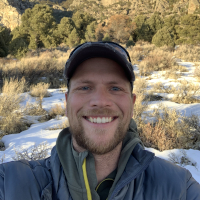
Home Department: Ecosystem Science and Management
Generally, I am interested in habitat ecology and habitat management. My current research is focused on the ecology of sharp-tailed grouse in south-central Wyoming. Little research has been conducted on this population of sharp-tailed grouse and through my research I am seeking to understand sharp-tailed grouse habitat selection, demographic rates, and sub-species status of this population. Specifically, I am going to look at what vegetation types sharp-tailed grouse select and how this impacts demographic rates and what subspecies this population belongs to.
Advisor: Riley Bernard
Home Department: Zoology and Physiology
I study bat population, community composition, health and diet in the southern Black Hills of South Dakota following the detection of white-nose syndrome (WNS) in the region. My research will be used to help the National Park Service make informed management decisions that will aid in the conservation of WNS-sensitive bat species.
Advisor: Lusha Tronstad
Home Department: Zoology and Physiology
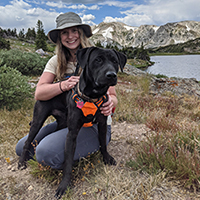
Advisor: Lauren Shoemaker
Home Department: Botany
My research is centered around community ecology and how species fluctuate through space and time. I have specific interests in spatiotemporal synchrony and stability in systems experiencing environmental change. Goals for my research include decomposing the roles of environment, species interactions, synchrony and evenness in driving overall ecosystem stability.
Advisor: Matt Carling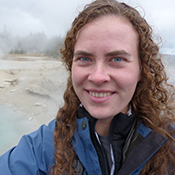
Home Department: Zoology & Physiology
I am obsessed with birds in general, and bird behavior and evolution more specifically. During my master's work on a gull colony in Washington I realized how fascinating hybridization is, and that hybridizing species can help us understand the process of speciation. Despite the fact that gulls are really cool, I have switched study systems and am currently conducting a comparative study of reproductive isolation in songbirds. Several pairs of closely related passerine species hybridize quite extensively but other pairs do not hybridize even though they sing similar songs, have similar ecologies, and share geographic ranges. I am hoping to associate patterns of environmental niche divergence, song divergence, and genomic divergence with patterns of hybridization or its converse, complete reproductive isolation. Ideally, I will be able to identify consistent patterns in the evolution of reproductive isolation across North American passerines.
Visit Libby's website for more about her research.
Advisor: Daniel Laughlin
Home Department: Botany
I study how plant form and function influence population and community responses to
stress and competition, particularly in grasslands. My dissertation research aims
to use functional traits to enhance our understanding of community assembly processes
and ultimately improve our ability to predict restoration outcomes. I am also passionate
about effective science communication and translating theory into management.
Visit Hailey's website for more about her research.
Advisor: Jacob Goheen
Home Department: Zoology and Physiology
Advisor: Jacob Goheen
Home Department: Zoology and Physiology
Advisor: Topher Weiss-Lehman
Home Department: Zoology and Physiology
Sergio Pérez received his bachelor’s degree from the University of Tolima in Colombia and has since worked as a researcher in many institutions including the Max Planck Institute for Biology in Germany, the Smithsonian Tropical Research Institute in Panama, and Louisiana State University in the USA. Sergio joined the Weiss-Lehman lab to investigate the role of phenotypic plasticity in spatial dynamics and species responses to global change. He is especially interested in linking theoretical models of plasticity to experimental results from our flour beetle microcosms.

Advisors: Annika Walters and Sarah Collins
Home Department: Zoology & Physiology
Ashleigh studies the ecological impacts of water quality issues ranging from sedimentation in spawning habitat to the environmental drivers of harmful algal blooms and zooplankton dynamics in reservoirs.
Visit Ashleigh's website for more about her research.
Advisor: Topher Weiss-Lehman
Home Department: Zoology and Physiology
Advisor: Ellen Currano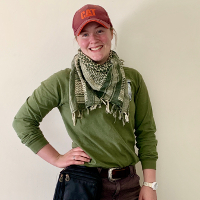
Home Department: Botany
I am interested in the early Eocene paleobotanic record, which here in Wyoming's Wind River Basin captures the Early Eocene Climatic Optimum (EECO). This event is characterized by some of the warmest temperatures in the past 65 million years, making it an ideal place to examine the plant response to warming in both vegetation structure and community composition. Because this climate event is so significant, it also lends itself well to analyzing the plant-insect interactions and their variability over the warming period.
Advisor: Sarah Collins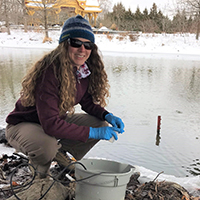
Home Department: Zoology and Physiology
As a limnologist, I enjoy using ecology, hydrology, chemistry, and biology to address issues impacting our fresh waters. I am part of the NSF EPSCoR Track II project to create a database of stoichiometric traits of organisms in their chemical habitats (STOICH) and to conduct related research. This database will be the first of its kind and will enable current and future freshwater scientists to expand the field of ecological stoichiometry and to build upon our understanding of patterns that result from mismatches between available elements and requirements by communities of organisms.
Visit Linnea's website for more about her research.
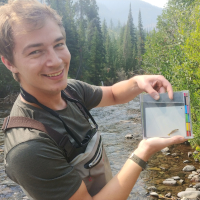
Advisor: Katie Wagner
Home Department: Botany
I use genomic data to understand both the evolutionary history and modern ecology of populations. My dissertation involves partnering with state, federal, and non-profit partners to study Wyoming’s native (and imperiled) Yellowstone cutthroat trout across its range. I hope to understand the effects of historic fish stocking, geography, and life history on the diversification of the subspecies and use this information to inform management decisions, stocking practices, and monitoring techniques. On a broader scale, I would like my work to contribute to the growing utilization of genetic data in conservation.
Visit Will's website for more about his research.
Advisor: Annika Walters
Home Department: Zoology and Physiology
I am a PhD student researching the effects of invasive fish management on water quality in Yellowstone Lake. I have experience working throughout the state of Illinois on fish conservation and water quality projects. In 2022, I received my Master’s degree from Southern Illinois University, where I studied the response of macroinvertebrates to fertilization treatments.
Advisor: Melanie Murphy
Home Department: Ecosystem Science and Management
I am a wildlife biologist with a primary interest in tropical and temperate ecosystems, particularly in wildlife monitoring and conservation. My research interests focus on the direct and indirect effects of human activities—such as illegal trade, wildlife disease, hunting, road development, land-use changes, habitat loss, and fragmentation—on animal reestablishment, distribution, abundance, and behavior. I am committed to generating insights that inform effective wildlife management, conservation strategies, and policy development. For my PhD, I will focus on enhancing the Wyoming toad recovery through disease mitigation.
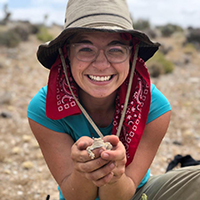
Advisor: David Tank
Home Department: Botany
My research broadly aims to understand how herbivory influences the diversification of plants. My dissertation research is focused on a tropical plant genus Tricalysia (Rubiaceae) located in sub-saharan Africa that displays an interesting suite of morphological and potential chemical defenses. I am using a comparative phylogenetic framework to understand and make inferences about how different defenses can shape plant evolution.
Visit Malia's website for more about her research.
Advisor: Anna Chalfoun
Home Department: Zoology and Physiology
I am broadly interested in how animals perceive and select resources on the landscape and the extent to which they can adjust behaviors to navigate habitats altered by humans. Currently, I am studying habitat selection-based fitness trade-offs, site fidelity, and full annual cycle spatial use of Loggerhead Shrikes nesting in sagebrush habitats disturbed by energy development. Additionally, I am examining how fine-scale habitat heterogeneity influences inter-annual nest site selection in sagebrush obligate songbirds and how fine-scale habitat elements influence landscape level biodiversity. I am also eager to contribute to the broader wildlife conservation community beyond research. To that end, I have worked with friends and colleagues to develop and run bird banding station to monitor avian migration in Laramie Wyoming that offers internship opportunities to undergraduate students and experiential learning to the public.
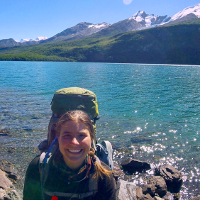
Advisor: Jerod Merkle
Home Department: Zoology & Physiology
My research explores the roles of cognition and sociality in group dynamics and collective decision making in migratory ungulates. I will use GPS data, camera traps, and drones in my data collection.
Advisor: Kevin Monteith
Home Department: Zoology and Physiology
I’m interested in predator-prey dynamics, nutritional condition and the behavior of large mammals. My dissertation examines mountain lion predation on endangered Sierra Nevada bighorn sheep and mule deer. I am investigating several aspects, including individual variation in prey selection, the effectiveness of escape tactics against ambush predators, partial migration and the influence of nutritional condition on predation rates of prey.
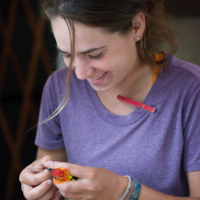
Advisor: Anna Chalfoun
Home Department: Zoology & Physiology
I am interested in the effects of human-induced habitat change on survival and fitness of animals across the full life cycle. Specifically, I am studying survival and fitness during understudied life stages, including the post-fledging and over-wintering stages, in sagebrush-obligate songbirds that breed near energy development.
Advisor: Merav Ben-David and Sarah Benson-Amram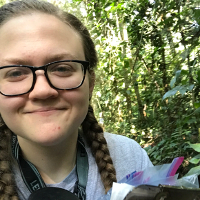
Home Department: Zoology & Physiology
I am broadly interested in cognitive ecology and animal behavior. My research focuses on the morphology, social structure, and cognition of wild raccoons in urban and rural spaces. I am interested in understanding what makes a successful urban species, how these animals learn to navigate these spaces, and how urban and rural environments may shape different cognitive and morphological traits. Here, I am looking to find a more efficient way to evaluate wild raccoon cognition using olfactory stimuli and to determine if urban environments may alter brain and skull morphology in wild raccoon populations across the US.
Advisor: Kevin Monteith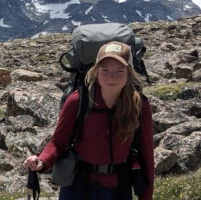
Home Department: Zoology & Physiology
I study the intersection of nutritional and disease ecology with a focus on resource allocation. Specifically, I am looking at how nutrition influences the effects of pneumonia on bighorn sheep, and how mothers can successfully reproduce in the presence of disease. I seek to improve how environmental factors contribute to population response to disease.
Visit Rachel's website for more about her research.
Advisor: Katie Wagner
Home Department: Botany
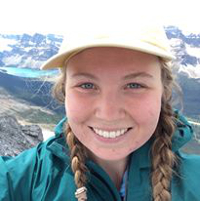
Advisor: Lauren Shoemaker
Home Department: Botany
I am a community ecologist studying how species coexistence shifts in the context of climate change. I’m interested in understanding how dispersal and species interactions are altered along a temperature gradient, with implications for predicting biodiversity change. My recent work has focused on uncovering the role of transient species on stable community dynamics. I build on existing ecological frameworks with the aim to bridge theory to applied restoration and management efforts across systems.
Visit Megan's website to learn more about her research.
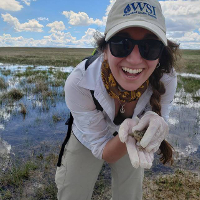
Advisor: Melanie Murphy
Home Department: Ecosystem Science and Management
Amphibians are experiencing global population declines and extinctions. As someone who grew up catching frogs and salamanders, my research endeavors are driven by a desire to understand the local and landscape factors influencing amphibian populations. Using the species found in the Rocky Mountains as my study system, my dissertation incorporates landscape genetics to assess amphibian rarity based on their niche breadth and functional connectivity. Additionally, I’m interested in how disease can shape a population’s distribution and ability to disperse.
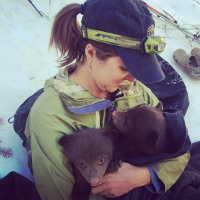
Advisor: Jerod Merkle
Home Department: Zoology & Physiology
Tana’s research focuses on the reintroduced bison population in Banff National Park, Canada, aiming to understand the underpinnings of how animals learn a novel environment and how that knowledge influences space use and home range formation.
Advisor: Bryan Shuman
Home Department: Geology and Geophysics
Advisor: David Christianson
Home Departmenr: Ecosystem Science and Management
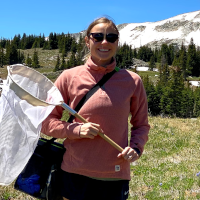
Advisor: Michael Dillon
Home Department: Zoology & Physiology
I broadly study queen bumble bee overwintering physiology. I am currently exploring how where a queen bumble bee overwinters influences her survival and energy usage while overwintering, and/or her fitness post-winter. Through a combination of field work, lab work, and empirical modeling approaches, I aim to predict if the changing climate may impact bumble bee abundance and spatial distribution now and in the future.
Advisor: Michale Dillon
Home Department: Zoology and Physiology
I am a PhD student in Dr. Michael Dillon’s lab and am broadly interested in insect adaptations to living in extreme environments. My current focus is on examining the effects of heat stress on bumblebee workers and its impact on overall colony success. Alongside my research, I am passionate about teaching and outreach. I love inspiring curiosity in learners of all ages, from preschoolers to older adults.
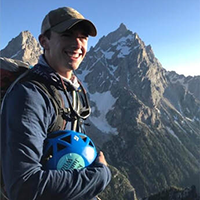
Advisor: Matt Kauffman
Home Department: Zoology & Physiology
I study mule deer migration with a focus on state-dependent resource-risk tradeoffs behavior, the origins and trade offs of spatial fidelity, and migratory adaptability under changing environmental conditions and disturbance. I use the Red Desert to Hoback migration, the 3rd longest terrestrial migration on earth, among others.
Visit Luke's website to learn more about his research.
Advisor: Tim Collier and Scott Shaw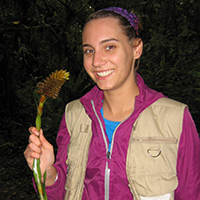
Home Department: Ecosystem Science and Management
I’m interested in reclamation and restoration science associated with energy development and how different reclamation practices affect the insect community and in turn, higher trophic levels. My research is primarily focused on insects of importance to sage grouse chicks. I’m interested in manipulating the plant species originally used to reclaim the land, to include more forbs and shrubs, to potentially increase the biomass of insect species vital to sage grouse development. I'm also very curious about the effect ants have on a reclaimed community through seed dispersal and predation and possible protection of plants from herbivores.
Program in Ecology and Evolution
Interdisciplinary Program
Debbie Swierczek, Program Coordinator
School of Graduate Education
Knight Hall 247
Phone: 307-766-4128
Email: ecology@uwyo.edu